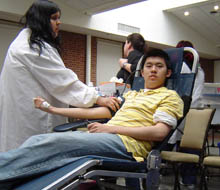| Maryland Newsline |
| Home Page |
Politics
|
| President of UMD's
Flagship Campus Responds to Deadly Va. Tech Shooting With Reassurances
Maryland Newsline posted Tuesday, April 17, 2007 3:15 p.m.; with updates at 4:50 p.m. COLLEGE PARK, Md. - In the wake of Monday’s deadly mass shooting at Virginia Tech University, the president of the University of Maryland’s flagship campus released a statement assuring “every parent and every member of our campus family that we are reviewing our own safety and security measures.” The statement was issued by President C.D. Mote Jr. via a campus-wide e-mail Tuesday morning, and followed a statement he published on the university Web site Monday to express his “deepest sympathies to the Virginia Tech Family,” as well as to those at Maryland who “have friends and colleagues in Blacksburg.” “A tragedy of this proportion shocks our nation and especially every college and university,” Mote said in his e-mail. “I am personally deeply saddened by this stunning news.”
He added that the attack, which left 33 dead in Virginia, including a gunman, “demonstrated that no community can be completely shielded from such an incomprehensible act.” The University of Maryland campus, he said, would review safety measures and continue to make the safety of campus “our highest priority.” He noted the university’s Department of Public Safety has more than 90 officers. The department has the capacity to lock all buildings from the Police Emergency Communication Center, if necessary, Mote said. Other security procedures include a gate system that screens vehicles entering campus between the hours of 10:30 p.m. and 4 a.m. and a keyless card access system on the exterior of the residence halls that records every entry and limits entry to those with a valid access card, Mote noted. In an emergency, the university would use a wide range of communication tools to keep the community informed - including campus-wide e-mail and voice mail, the university Web site and the communications systems available on the Early Warning Siren and StormReady Systems, Mote noted. He said it was important for the community to be aware of the university’s emergency procedures, posted at www.umpd.umd.edu. Meanwhile, Dr. Francine Favretto, director of the Center for Young Children, which teaches 110 pre-schoolers and kindergarteners in a building on North Campus, said she took additional security steps earlier this school year, following shootings at an Amish schoolhouse in Pennsylvania. “I believe we are as secure as you can be on an open campus,” Favretto said. The center added an entry code as well as a panic button system, she said. Several panic buttons - connected to campus police - are located throughout the center. “You want to be proactive, not reactive,” said Favretto. Visitors must also show identification and explain the reason for their visit, she said. News of Monday’s shooting - the deadliest shooting rampage in American history - rippled throughout the campus community, causing some professors to alter lesson plans. Associate Professor Mike Williams used a basic online journalism class to
touch subjects related to coverage of similar tragedies. The tragedy also prompted some students to pause for moments of silence and prayer, and propelled others to a blood drive on campus.
"I heard about it through my friend ... that people could donate blood,"
said Brooke Hackey, 21, a junior interdisciplinary studies major who was
among students giving blood at the pre-scheduled Red Cross drive. "I
always wanted to do it, and I think that is a really good reason, because of
what happened," she said. Mote called for a moment of silence following the chapel bells at noon Tuesday to “reflect on life and values in remembrance of those whose lives ended so abruptly.” Some students were drawn to the chapel to say their prayers.
She said she knows someone from her church who goes to Virginia Tech. "It was kind of scary because ... we did not reach him at first. But we eventually reached him, and he is OK." Kim Capps, a chaplain with the United Methodist Campus Ministry, was helping to lead prayers at the chapel.
"I think that people are really longing for a sense of comfort and hope,” she said. “And there is a sense of connection here, and probably on all campuses in particular." Copyright ©
2007 University of Maryland Philip Merrill College of
Journalism
|

